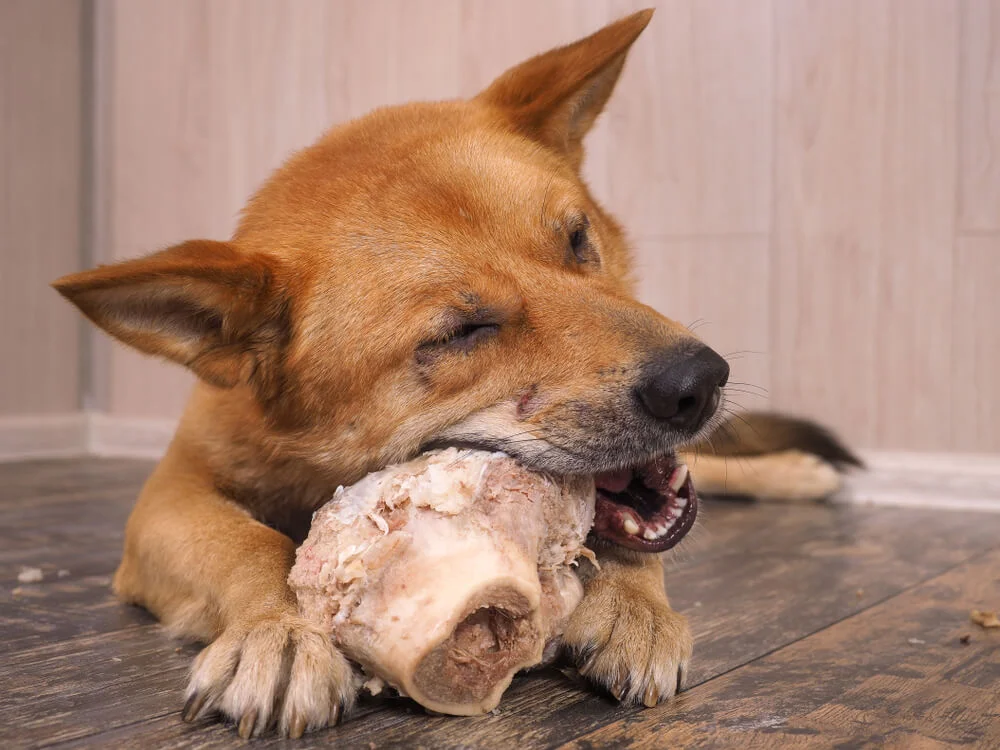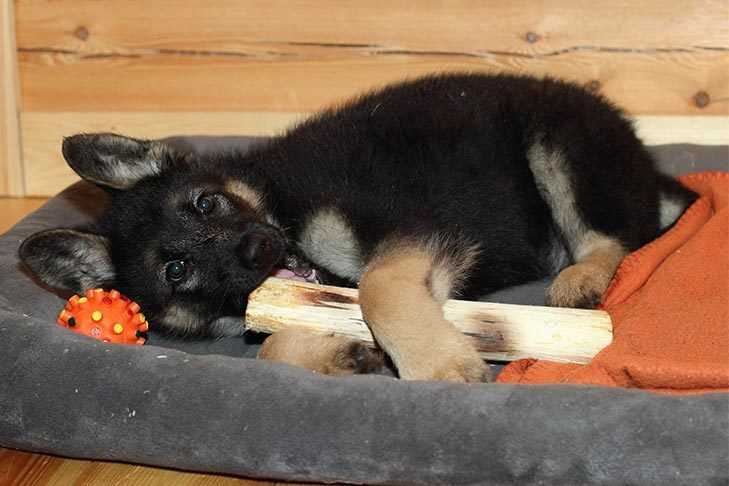



Feeding bones to dogs is a controversial topic among pet owners. While some believe that bones, particularly cooked beef bones, can be a flavorful and nutritious treat for dogs, others caution against the potential risks associated with feeding bones to dogs.
It is important to note that cooked bones, especially beef bones, can splinter and cause serious harm, including fractured teeth, choking, and intestinal blockage.
According to veterinarians and animal experts, it is generally recommended to avoid giving cooked bones to dogs. Instead, they suggest offering safer alternatives such as commercially available dog chews or specially designed toys that are made to be chewed on. These alternatives are less likely to cause injury and provide a safe outlet for a dog’s chewing instinct.
Furthermore, bone fragments can cause damage to a dog’s digestive system. If a bone fragment becomes lodged in the intestines, it may require surgery to be removed.
If you are unsure about what treats are safe for your dog, it is always best to consult with a veterinarian who can provide personalized advice based on your dog’s individual needs and health.
Can dogs eat cooked beef bones: what you need to know

Many dog owners wonder if it is safe to give their furry friends cooked beef bones. While dogs are known for their love of bones, it is important to be cautious when it comes to feeding them beef bones.
Potential risks of feeding cooked beef bones to dogs
Feeding dogs cooked beef bones can pose several risks to their health. Cooked bones can splinter easily, which can lead to choking hazards and potentially cause damage to the digestive tract. These splinters can be sharp and can cause injuries to a dog’s mouth, throat, or intestines.
Additionally, cooked bones can be very hard and can cause broken teeth. This can be extremely painful for dogs and might require veterinary intervention.
Alternatives to feeding cooked beef bones
If you still want to treat your dog to a bone-like snack, there are safer alternatives available:
| Safe alternatives to cooked beef bones | Unsafe alternatives to cooked beef bones |
|---|---|
| Raw bones that are specifically meant for dogs | Cooked bones of any kind |
| Dental chews or toys | Bone fragments or small bone pieces |
| Frozen dog-friendly treats | Bones from poultry or fish |
It is always essential to consult with your veterinarian before making any changes to your dog’s diet. They can provide you with appropriate recommendations based on your dog’s specific needs and health.
In conclusion, it is best to avoid feeding cooked beef bones to dogs due to the potential risks they pose. Opt for safer alternatives that can provide similar chewing satisfaction without the associated dangers.
Potential Risks of Feeding Cooked Beef Bones to Dogs
Feeding cooked beef bones to dogs may seem like a treat, but it can actually pose several potential risks to their health. While dogs naturally have a strong desire to chew on bones, it is essential to consider the following concerns before giving them cooked beef bones:
1. Splintering: Cooked bones are more likely to splinter compared to raw bones. When dogs chew on cooked beef bones, they may break into sharp fragments that can easily lodge into their throat, stomach, or intestines, leading to injuries or blockages.
2. Tooth Damage: The hardness of cooked bones can be detrimental to a dog’s teeth. The excessive force applied during chewing may result in fractures, chips, or even the complete breakage of their teeth. This can lead to extensive dental issues, including pain, infections, or the need for tooth extraction.
3. Gastrointestinal Obstruction: Cooked beef bones can cause significant gastrointestinal problems when ingested. The bones can fragment into smaller pieces that may become lodged in a dog’s digestive tract. This can cause blockages, severe pain, vomiting, diarrhea, or even require surgical intervention to remove the obstruction.
4. Bacterial Contamination: Cooking beef bones does not eliminate the risk of bacterial contamination. Consuming bacteria such as Salmonella or Escherichia coli can lead to food poisoning in dogs. Symptoms may include digestive upset, fever, lethargy, or, in severe cases, organ failure.
5. Nutritional Imbalance: While bones can be a source of essential nutrients, feeding excessive amounts of cooked beef bones can disrupt a dog’s balanced diet. Bones should not replace regular meals, as they are low in essential vitamins, minerals, and other necessary nutrients. Overconsumption of bones can lead to nutritional imbalances and potential health issues over time.
It is crucial to prioritize your dog’s health and well-being by avoiding the potential risks associated with feeding cooked beef bones. Instead, consider providing them with safer alternatives specifically designed for chewing, such as commercially available dog toys or treats specifically formulated to promote dental health.
Always consult with your veterinarian to ensure you are making the best decisions for your dog’s diet and overall health.
Benefits of raw beef bones for dogs
Raw beef bones can provide numerous benefits for dogs, including:
Dental health: Chewing on raw beef bones helps reduce plaque and tartar buildup, promoting good oral hygiene and preventing dental diseases such as periodontal disease.
Mental stimulation: Gnawing on bones can be mentally stimulating and help alleviate boredom, providing a positive outlet for a dog’s natural chewing instincts.
Nutritional value: Raw beef bones are a natural source of essential nutrients such as calcium, magnesium, and phosphorous. These minerals are important for maintaining healthy bones, teeth, and overall growth and development.
Strengthens jaw muscles: The act of chewing on beef bones helps strengthen a dog’s jaw muscles, improving their biting and chewing abilities.
Natural teeth cleaner: As dogs chew on raw beef bones, the bones help remove food particles and plaque from their teeth, acting as a natural toothbrush.
Stress relief: Chewing on bones can help dogs relieve stress and anxiety, providing a calming and soothing effect.
Note: It’s important to supervise your dog while they’re chewing on raw beef bones to ensure they don’t swallow large pieces, which can cause choking or digestive issues. Consult with your veterinarian before introducing raw bones into your dog’s diet.
Alternatives to cooked beef bones for dogs
While cooked beef bones may seem like a tasty treat for your furry friend, they can actually be dangerous for dogs. Cooked bones can splinter and cause serious injuries, including broken teeth, choking, or intestinal blockages. Therefore, it’s important to explore alternatives that are safer for your dog to enjoy.
Here are some healthy and safe alternatives to cooked beef bones:
1. Raw bones: Raw bones, such as raw meaty bones or recreational bones, are a great alternative to cooked beef bones. They are softer and less likely to splinter, making them safer for your dog to chew on. Make sure to choose appropriate raw bones for your dog’s size and breed.
2. Rubber or nylon chew toys: There are plenty of durable chew toys available in pet stores that can keep your dog entertained and help with dental hygiene. Look for toys that are specifically designed for aggressive chewers and made from safe materials.
3. Kong or puzzle toys: Kong toys are interactive treat-dispensing toys that can keep your dog mentally stimulated. You can stuff them with healthy treats or freeze them with peanut butter for a longer-lasting challenge. Puzzle toys are another great option to keep your dog engaged and entertained.
4. Dental chews: Dental chews are designed to promote oral health in dogs while providing a satisfying chewing experience. They are usually made from natural ingredients and can help remove plaque and tartar buildup.
5. Rawhide alternatives: If your dog enjoys chewing on rawhide but you’re concerned about its safety, there are several rawhide alternatives available on the market. These alternatives are typically made from vegetable-based materials and are easier to digest.
Remember, it’s always best to consult with your veterinarian before introducing any new treats or toys to your dog’s diet. They can provide personalized recommendations based on your dog’s specific needs and dietary restrictions.
Consulting with a veterinarian about your dog’s diet
When it comes to feeding your dog, it’s always a good idea to consult with a veterinarian. They can provide expert advice tailored to your dog’s specific needs and help you make informed decisions about their diet.
Why should you consult with a veterinarian?

Your veterinarian has knowledge and expertise in animal nutrition and can evaluate your dog’s health, age, breed, and lifestyle to determine the best diet for them. They can also address any specific dietary needs or concerns your dog may have, such as allergies or health conditions.
Additionally, consulting with a veterinarian can help prevent nutritional deficiencies or imbalances that could result from an inadequate or inappropriate diet. They can guide you through different feeding strategies, portion sizes, and types of food that will nourish your dog and promote their overall well-being.
What to discuss with your veterinarian
During your consultation, be prepared to discuss your dog’s current diet, including the brand, type of food, and feeding schedule. You should also mention any recent changes in their appetite, weight, or behavior that could be related to their diet.
Your veterinarian may ask questions about your dog’s activity level, any medications they are taking, and any known allergies or sensitivities. They may also recommend specific dietary adjustments or even prescribe specialized dog food formulas, especially if your dog has specific health concerns or needs.
It’s important to be open and honest with your veterinarian and provide accurate information about your dog’s diet and lifestyle. This will enable them to make the best recommendations to ensure your dog receives the proper nutrition they need to thrive.
Questions and answers
Can I give my dog cooked beef bones?
It is not recommended to give your dog cooked beef bones. Cooked bones can splinter and cause serious digestive issues or even internal injuries.
Why are cooked beef bones dangerous for dogs?
Cooked beef bones are dangerous for dogs because they can splinter when chewed and the sharp fragments can cause damage to the dog’s mouth, throat, stomach, or intestines.
What should I do if my dog eats a cooked beef bone?
If your dog eats a cooked beef bone, it is important to monitor them closely for any signs of discomfort, such as vomiting, diarrhea, or difficulty breathing. If you notice any of these symptoms, you should immediately contact your veterinarian.
Are there any safe alternatives to giving dogs cooked beef bones?
Yes, there are many safe alternatives to giving dogs cooked beef bones. Some options include raw bones specifically designed for dogs, rubber chew toys, or interactive puzzle toys that can help keep your dog entertained and stimulated.
What are the potential risks of giving cooked beef bones to dogs?
The potential risks of giving cooked beef bones to dogs include choking, blockages in the digestive system, tooth fractures or breakage, and damage to the dog’s internal organs. These risks can be very serious and even life-threatening.






